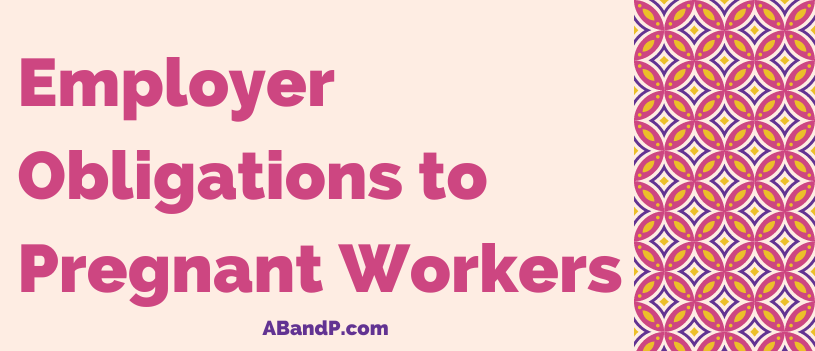Women make up half of the American workforce and that number continues to increase annually. This is why it is essential that employers understand how to properly handle a situation where a pregnant employee may have work limitations. If dealt with poorly, then this could potentially result in legal issues for a business. To avoid liability, businesses must understand what is expected from them as employers as they have pregnant staff members.
In 1978, Congress passed the Pregnancy Discrimination Act (PDA) which forbids discrimination based on pregnancy and childbirth in regards to employment. This could include hiring, firing, job assignment, training, benefits, pay, and more. Essentially, it requires businesses to provide the same accommodations to pregnant women as other staff members. Besides federal law, almost 50% of the states have adopted regulations that require businesses to provide work accommodations to pregnant women as well.
Another important federal law is the Americans with Disabilities Act (ADA) as this imposes certain obligations for employers regarding pregnant employees. The ADA also forces employers to provide reasonable accommodation to staff with a disability. Although pregnancy is not considered a disability, there are various pregnancy-related conditions that qualify as a disability such as morning sickness, preeclampsia, anemia, depression, and swelling of the feet and legs.
In a 2015 Supreme Court case, Young v. UPS, the Court ruled in favor of a pregnant UPS driver who challenged UPS for denying her light duty work assignments during her pregnancy. UPS argued that light duty was only available for those who were injured on the job. In the end, the court concluded that employers should provide a reasonable accommodation to pregnant employees to the same extent that is offered to any other employee that may be limited. Out of the Supreme Court case, came the Pregnant Workers Fairness Act in 2019. If this proposed law would have passed, it would have mandated that businesses utilize the “interactive process” to determine what should be considered a reasonable accommodation for pregnant workers.
Today, legally employers cannot fire, demote, refuse to hire, or take adverse action against a woman motivated by the individual’s pregnancy, childbirth, or other related medical conditions. Similarly, businesses cannot discriminate solely based on an employee’s intention to become pregnant or force an employee to take leave due to being pregnant. If the employee cannot fulfill their job duties due to pregnancy limitations, they are entitled to accommodations under the PDA or ADA as an employer should attempt to provide “reasonable” accommodations.
If you have an employee that develops limitations that may affect their job performance during their pregnancy, you should carefully consider the following questions:
-What limitations is the employee experiencing?
-How do these limitations affect job performance?
-What specific tasks that pose a problem? and
-What accommodations could reduce or eliminate the job performance issues?
Although limitations are a broad category, the following could be considered functions that are affected by pregnancy related limitations: carrying, kneeling, lifting, bending, standing, pushing, toileting, or dietary needs.
As employers, it is crucial that you understand how you can assist your employees when in need. There have been a lot of changes throughout the years when it comes to employer workplace obligations to pregnant staff. Employers should become familiar with what is required of them when they have a pregnant worker who requires accommodations as defending a claim due to failure to accommodate can be very difficult for a business. To avoid this situation, it is best that you take the time to research what is required of you and consult with a human resource specialist.
